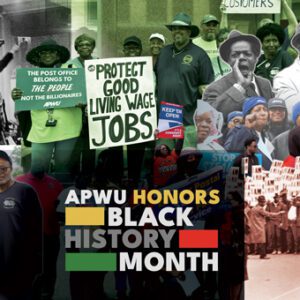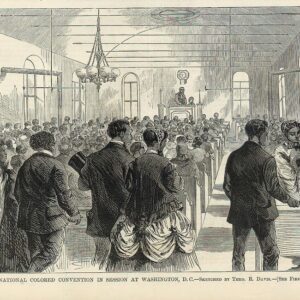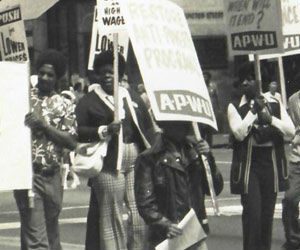August 31, 2009
Studs Terkel: The Voice of Work and the American Worker
“If I did one thing I’m proud of, it’s to make people feel that together, they count.” – Studs Terkel, 2007
Late last year, the city of Chicago — and working people everywhere — lost a great voice when Louis “Studs” Terkel died at age 96.
For more than 70 years, the radio and TV host and prolific author chronicled the aspirations of working people in their pursuit of the American Dream, and railed against the powerful interests that held them back — from the anti-union industrialists who fought New Deal-era labor reforms to the CEOs of today’s financial institutions.
Over the 45 years (1952-1997) in which “The Studs Terkel Show” was a popular feature on Chicago’s WFMT radio station, he interviewed thousands of noteworthy figures who shaped history, including Paul Robeson, Martin Luther King Jr., Bob Dylan, Maya Angelou, Margaret Mead, and Daniel Ellsberg.
But Terkel believed that it was the “uncelebrated” people — he loathed the term “ordinary” — who made the world go around. Through thousands of radio programs and dozens of books and articles, he became known for airing the stories of the nation’s unsung heroes: workers; union, civil rights, and community activists; and others like them in an effort to record history from the perspective of regular folks.
Born in 1912, he grew up in a gritty rooming house his family operated in a Chicago neighborhood known as Bughouse Square. The home’s lobby and a nearby park became a gathering place for labor leaders, dissidents, and “soapbox orators” of all stripes, and as a teenager in the Great Depression, Terkel was profoundly influenced by their activities.. “They would argue, they would debate,” he recalled. “They believed that this country was founded on the idea that an ordinary person could say to the big shot, ‘bug off!’…That affected me a great deal.”
Chicago Law
 Terkel graduated from the University of Chicago’s law school in 1934, but had no interest in practicing law. Instead, he joined the Works Progress Administration’s Federal Writers Project, composing scripts for plays and radio programs, and lending his voice to characters in dramatic productions. As a radio actor, he once portrayed a recurring character in the novels of Chicago writer James T. Farrell, Studs Lonigan, and the nickname stuck.
Terkel graduated from the University of Chicago’s law school in 1934, but had no interest in practicing law. Instead, he joined the Works Progress Administration’s Federal Writers Project, composing scripts for plays and radio programs, and lending his voice to characters in dramatic productions. As a radio actor, he once portrayed a recurring character in the novels of Chicago writer James T. Farrell, Studs Lonigan, and the nickname stuck.
In 1944, Terkel began to host his own show — the first of several radio and TV programs that would bear his name. He played an eclectic mix of jazz recordings, commented on politics and sports, and held wide-ranging conversations with his guests.
In the early 1950s, Terkel hosted Studs’ Place, an unscripted TV show in which he played the owner of a Chicago diner frequented by colorful characters — some of them famous, but many of them just people he knew from the neighborhood.
The show was well-received but short-lived: The outspoken host’s politics got him in trouble in 1953, when the entertainment industry bowed to pressure from U.S. Sen. Joseph McCarthy’s notorious anti-communist campaign. “I seldom met a petition I didn’t like,” Terkel told USA Today many years later. “Anti-Jim Crow? Peace with the Soviet Union? I signed them. So this fellow from NBC flies from New York and says to me, ‘You’re a valuable property.’ Valuable property. That’s what he said. And he tells me, ‘All you’ve got to do is say you were duped.’ ”
Terkel told him to bug off.
Radio Days 
Blacklisted from television, in 1954 he carried The Studs Terkel Show over to a fledgling FM radio station, WFMT, where he would work for the next 45 years. Terkel’s skill as an interviewer earned him wide acclaim, and he even persuaded a reluctant Marlon Brando to appear on his show. The reticent movie star became so engaged in the program that he demanded, and got, a second hour in which to expound.
Terkel published his first book, Giants of Jazz, in 1956, launching a career as a celebrated author of such works as Hard Times: An Oral History of the Great Depression (1970).
In one of his best-known books, “Working: People Talk About What They Do All Day and How They Feel About What They Do” (1974), Terkel interviewed hundreds of people in a wide array of occupations — plant managers, waitresses, coal miners, cab drivers and union leaders — probing not only for what their work entailed, but also for who they were and what they yearned for.

Many simply wanted to be treated with more dignity and respect, a recurring theme in Terkel’s books. “Working in the fields is not in itself a degrading job,” one farm worker told Terkel. “But the growers don’t recognize us as persons,” he added. “That’s the worst thing, the way they treat you. Like we have no brains. They have only a wallet in their head.”
His 1985 book, “The Good War — An Oral History of World War Two,” won a Pulitzer Prize for non-fiction. Terkel also was widely lauded for My American Century (1997). That same year, President Clinton awarded him the National Humanities Medal. In 2006, the labor movement honored Terkel when the American Rights at Work organization presented the then-93-year-old with its lifetime achievement award.
Accepting the honor, Terkel observed, “What brings workers together can be a belief, a hope of improving the climate and community at work — the spaces where so many of us spend so much of our lives. Respect on the job and a voice at the workplace shouldn’t be something Americans have to work overtime to achieve.”
Studs Terkel died Oct. 31, 2008, just days before the historic election of Barack Obama.
In His Own Words
Terkel believed that many of the most important lessons of the 20th Century have been lost. In a July 2005 interview, he told an AFL-CIO publication:
“The thing that’s so ironic, is we are stuck with what I call ‘national Alzheimer’s disease.’ The general American public, through no fault of its own, but through the media — which is laughingly called, absurdly called, obscenely called — liberal media, which is a joke, of course. But the point is that because of that day after day after day of the putting down of labor organizations, or not mentioning them, that has led to the children not knowing a thing about it.
“We can’t make any choices unless we connect the past with the present. The thing that horrifies me is the forgetfulness.”




